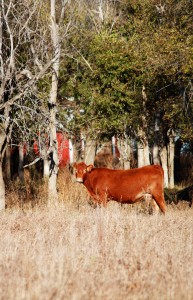 A group called the Vegetarian Society is standing up once again attribute global warming and the end to the universe to meat eaters. The article, Climate chief Lord Stern: give up meat to save the planet, published in Times Online, urged folks to turn vegetarian in order for the world to conquer climate change.
A group called the Vegetarian Society is standing up once again attribute global warming and the end to the universe to meat eaters. The article, Climate chief Lord Stern: give up meat to save the planet, published in Times Online, urged folks to turn vegetarian in order for the world to conquer climate change.
In an interview with The Times, Lord Stern of Brentford said: “Meat is a wasteful use of water and creates a lot of greenhouse gases. It puts enormous pressure on the world’s resources. A vegetarian diet is better.”
He predicted that people’s attitudes would evolve until meat eating became unacceptable. “I think it’s important that people think about what they are doing and that includes what they are eating,” he said. “I am 61 now and attitudes towards drinking and driving have changed radically since I was a student. People change their notion of what is responsible. They will increasingly ask about the carbon content of their food.”
This is absolute bogus and total hypocrisy. I recently compiled a top ten list of ways that meat production is beneficial to the environment, and I firmly believe that agriculturalists are the original environmentalists, serving as stewards of the land and care givers to the livestock. And, more importantly consumers should feel confident in serving a well-balanced, wholesome meal (that includes animal protein) to their families. It’s amazing how a few animal rights activists and trendy green advocates can create a buzz so big with their banter that they can actually change mainstream public perceptions on the good, wholesome food we eat. Thanks for the soap box. Now, here is a few statistics from my list…
1. American agriculture is sustainable for the future. In the United States, 98 percent of farms are family farms. Today’s American farmer feeds about 144 people worldwide. 2009 versus 1960: 1.8 million less farms are feeding a U.S. population that has increased 61 percent. (Explore Beef)
2. According to the Environmental Protection Agency, the entire U.S. agriculture sector accounts for only 6 percent of annual U.S. greenhouse gas emissions. Of this, livestock production is estimated to account for 2.8 percent of total U.S. emissions. (EPA Climate Change Report)
3. If livestock production disappeared tomorrow, wouldn’t we just be transporting more tofu around? And wouldn’t we just be plowing and fertilizing the land to supply PETA’s vegetarian utopia? (Center for Consumer Freedom)
4. Grazing animals on land not suitable for producing crops more than doubles the land area that can be used to produce food. If 1955 technology were used to produce the amount of beef raised today, 165 million more acres of land would be needed – that’s about the size of Texas! (Explore Beef)
